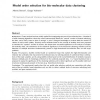87 search results - page 7 / 18 » Random Selection with an Adversarial Majority |
BMCBI
2007
13 years 8 months ago
2007
Background: Cluster analysis has been widely applied for investigating structure in bio-molecular data. A drawback of most clustering algorithms is that they cannot automatically ...
EUROCOLT
1999
Springer
14 years 7 days ago
1999
Springer
Abstract. Recent works have shown the advantage of using Active Learning methods, such as the Query by Committee (QBC) algorithm, to various learning problems. This class of Algori...
TMI
2010
13 years 2 months ago
2010
Classification of brain images obtained through functional magnetic resonance imaging (fMRI) poses a serious challenge to pattern recognition and machine learning due to the extrem...
STOC
2002
ACM
14 years 8 months ago
2002
ACM
A randomized algorithm is given that solves the wait-free consensus problem for a shared-memory model with infinitely many processes. The algorithm is based on a weak shared coin ...
ICDCN
2011
Springer
12 years 11 months ago
2011
Springer
We address the problem of designing distributed algorithms for large scale networks that are robust to Byzantine faults. We consider a message passing, full information model: the ...

